#Magic System
Text
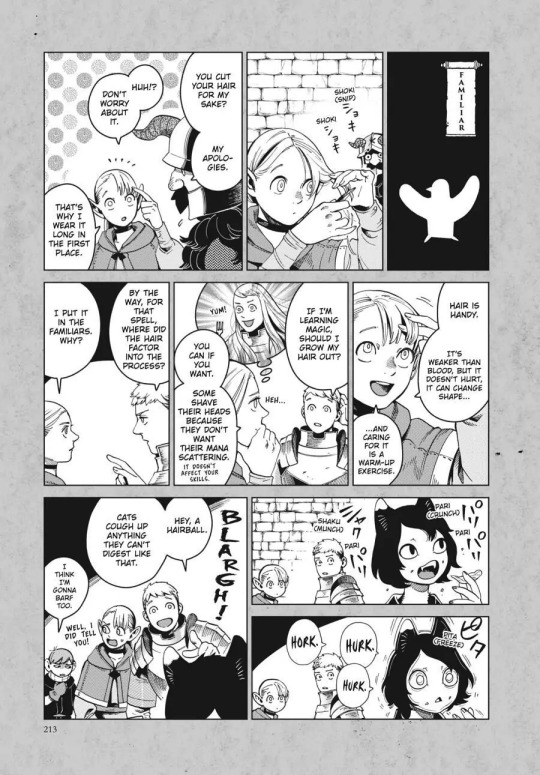
Monster Tidbits - Familiar
#dungeon meshi#Monster Tidbits#Familiar#Marcille Donato#Magic System#worldbuilding#Laios Touden#Izutsumi#Laios Party
527 notes
·
View notes
Text
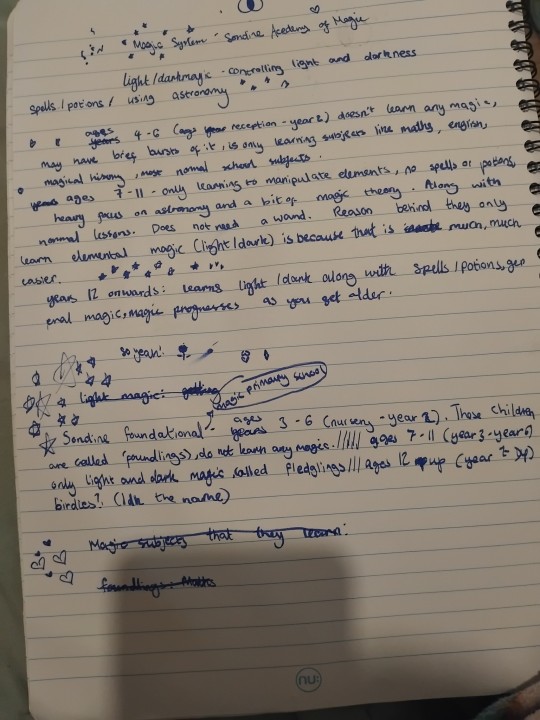
Magic system I'm working on, pls give some ideas :)
#magic world#magic building#worldbuilding#fantasy#fantasy worldbuilding#magic#magic school#magic system
17 notes
·
View notes
Text
Magic system, but bad
TY for the open tag @illarian-rambling
Rules: describe the magic system of your current WIP as poorly as possible. Bonus points if you use bullet points
Hehehehe… time to do my worst!
• Magic is all around, and very subtle
• Prophecy and divination are most common
• Unexplained event? Must be magic!
• Communing with the spirits is best done in a trance
• And the best way to work up a trance? Lots of incense, alcohol, and certain plants/fungi (being sleep deprived also helps)
• Best way to glimpse things that cannot be seen normally is through dreams
Tagging @theink-stainedfolk @leahnardo-da-veggie @rivenantiqnerd @talesofsorrowandofruin @winterandwords
@poethill @xenascribbles @late-to-the-fandom @smudged-red-ink @theeccentricraven
@the-ellia-west and open tag!
#tag game#open tag#writing#creative writing#writer#writers#writers and poets#writing community#writer on tumblr#writeblr#current wip#magic#magic system
17 notes
·
View notes
Text
ok the last post was infodump friendly. this one is NOT.
i expect you to explain your/something about your magic system as badly as possible. i want to be confused. i want to lack context.
i'll start:
big wyrm gives off radiation that is also magic. ohhh no gas.
#i am definitely not doing these posts because im procrastinating actually working on my stories what makes you say that#writeblr#original fiction#worldbuilding#writers on tumblr#writeblr tag games#maybe? you guys can do it if you want#im not sure who to tag tho so im just leaving this open#creative writing#magic system
1K notes
·
View notes
Text

#motherwilds#webcomic#worldbuilding#artists on tumblr#webtoon#nature#illustration#art#digital art#cross section#magic system
268 notes
·
View notes
Text
cirque de la vie lore!
some cirque de la vie lore crumbs for those interested!
if you haven't come across the au yet, here is a list of posts as of now:
the songbirds+skizz and tango
etho and bdubs
martyn and cleo comic part 1
comic part 2
comic part 3
IMPORTANT: the magic/sigils system used in this au (specifically the symbols themselves) is original- it's something i pulled directly from my oc's universe because i didn't want to make a whole new elemental magic system. that being said, outside the context of this au, PLEASE DON'T USE IT! i have other plans for my oc project eventually, and i'd like to keep the system within the realm of my work
and here we go!

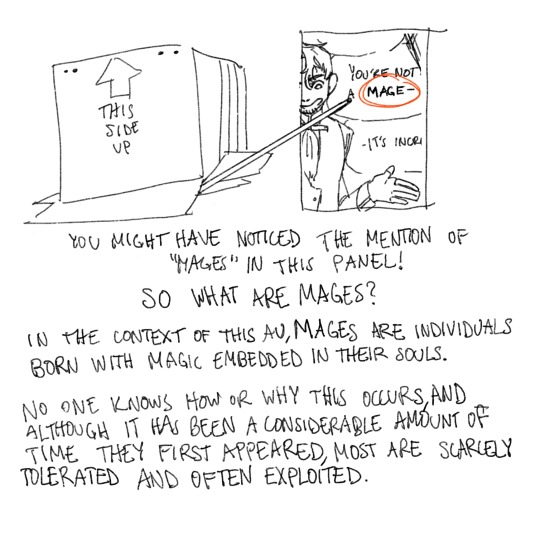
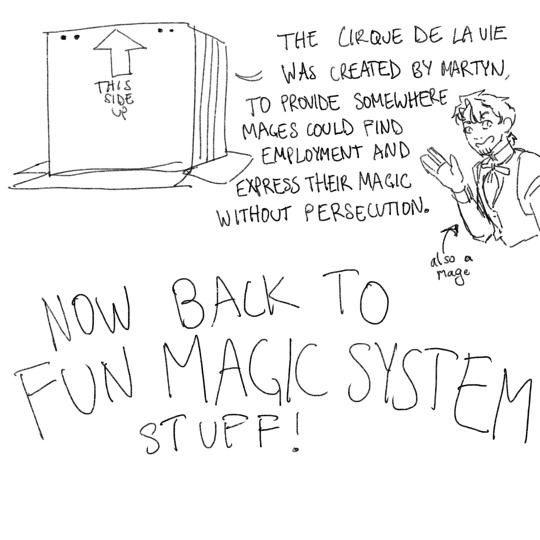
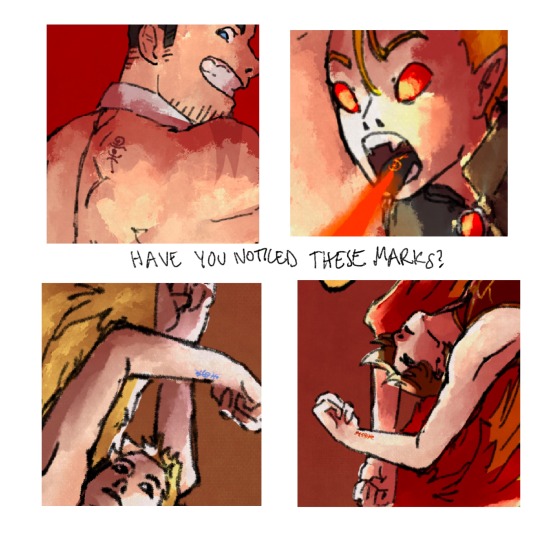
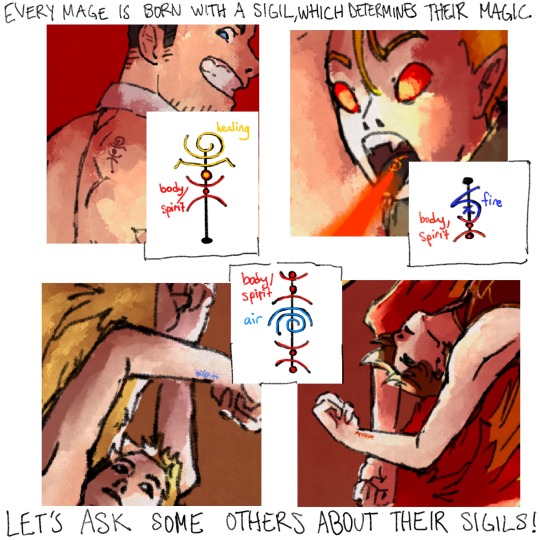
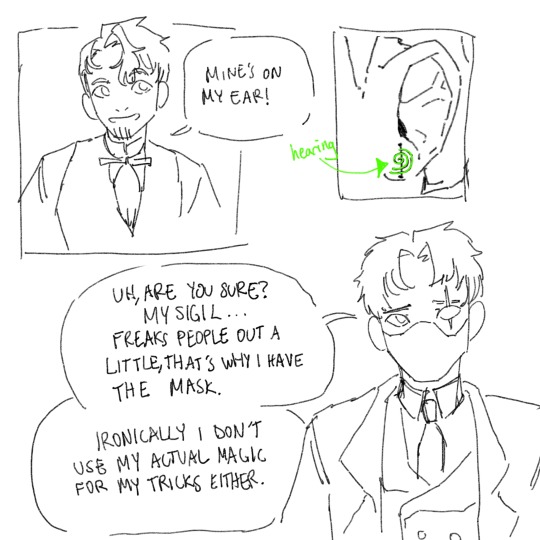
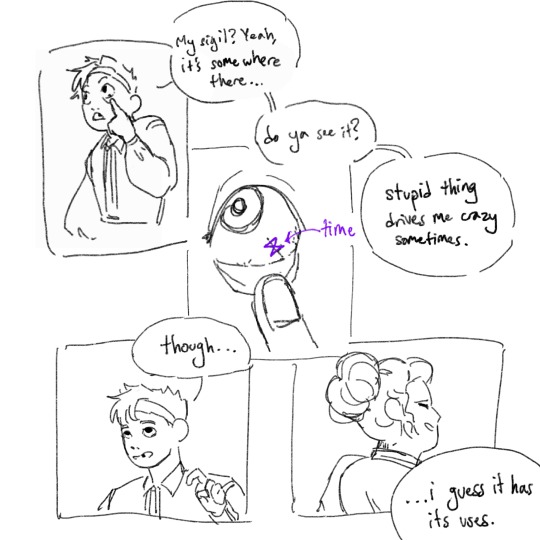
and that's all! if you have any questions, my ask box is open!
coming soon: shinyduo!
#traffic smp#trafficblr#life series smp#3rd life#secret life#double life#last life#limited life#magic system#world building#life series au#CirqueDeLaVieAU
296 notes
·
View notes
Text
Plot Holes and How to Fill Them (Or, The Hidden Potential in Your Mistakes)
“But why didn’t they just do that earlier!”
“You can time travel – so time travel!”
“Doesn’t X have Y spell? Why aren’t they using it to escape?”
“You. Have. Telekinesis! How are you this stupid?”
Plot holes! The bane of every writer’s existence. You think you’ve polished your beautiful manuscript, you have it all sent out for the masses to consume and praise and shower with compliments and adoration… and then they start tugging at a thread that may or may not begin to unravel your entire story. You’ve read this thing top to bottom, forwards and backwards and upside down, so many times the letters are burned into your brain. You mumble your monologues in your sleep — how did you not see this? How do you fix this?
See this post about beginning the writing process that might help you avoid opening a plot hole entirely with a solid enough script and outline.
Types of Plot Holes
Your magic system’s established rules have just been broken for TeNSioN
Your Deus Ex Machina really did come out of nowhere and is quite out of character
Why doesn't Character just run away from a fight they can't win?
Characters forgetting they have superpowers, extreme intelligence, handy tools or weapons, survival skills, common sense, or crucial information to escape and/or solve a situation
Characters dying for the above mistakes when said death could have been avoided
The entire story could have been avoided had Character A just told Character B the truth
Character X should have known ___ all along given their profession/backstory/friend circle/education/personality
And variations of the above, I’m sure I’m missing a couple. Fixing plot holes generally come in two camps: Those you can fix by rewriting the existing manuscript that contains the hole, or those you have to work around from a previous manuscript that’s already been published.
Why Plot Holes Happen
Plot holes happen in reality. Expecting your first, second, or 15th draft to be completely foolproof is utter nonsense. Real people forget stuff they’re supposed to know all the time, tools that would be useful are left behind, GroupThink makes very bad decisions.
The difference is: You are writing fiction. Your goal is to be entertaining, not necessarily realistic. A character simply *forgetting* Macguffin X at the climax of the story does not make for an entertaining read, no matter how likely it might be to happen in the real world.
You’re making this entire world up as you go and that alone is an impressive feat millions of others can only dream about – cut yourself some slack, okay? Everything is fixable.
Plot holes also happen because we’re so engrossed in our own story that we forget it’s all made up. You’re 22 chapters into a 24 chapter novel and you’ve just realized your psychic hero would never have been caught unawares like this. “But that’s just how he is!”
No. Stop. That’s not just how he is. That’s just how you wrote him – and you can go back and un-write him. Any excuse you can dream up you can un-write, and unfortunately, you’ll likely have to do a fair bit of it if you still have the opportunity.
Plot holes generally open long after the inciting incident that causes them. If you’re going to fix it, duct-taping together a solution in that very same scene isn’t the way to do it. You have to figure out why it’s a hole at all, then go back and fix its foundations.
Finding Your Own Plot Holes
Sometimes you’re lucky enough to stumble upon them before it’s too late. A fair bit of the time, though, your audience has to tell you. Finding your own plot holes requires stepping back from your work and looking at it like you’re just a reader, not the author.
Read your plot out loud to yourself and keep asking questions like:
Does this make sense for the scene?
Does this only exist to look cool at the cost of logic?
Are these rules I wrote too easy to break or contradictory in any way?
Is there any other way for this character to escape this situation?
Is the only solution here too contrived?
That, and having an army of beta readers who should show you flaws you’ve overlooked. Even then, some things just aren’t obvious at all until someone too smart for their own good points out something no one else considered before.
It’s okay. It’s not the end of the world.
Filling Plot Holes
Fix your broken magic system
A “magic system” broadly describes any type of powers/abilities/supernatural entities that function in your world. They can be in high fantasy, urban fantasy, sci-fi, or any genre really. The Force is a magic system, as much as is bending in Last Airbender even if no one calls it “magic”.
For example: Force users are telekinetic… and yet don’t simply repeatedly spam the “chuck my enemies into a wall/off a cliff/anywhere that is away from me” button. It’s what you’d call a “soft” magic system, it doesn’t have explicit rules on how and when it can and should be used. It just *is*.
Fixing holes in your magic system first demands examining why you wrote it the way you did, why you gave it these specific rules, or why you didn’t, and all the ways characters should otherwise be able to use it when your story demands they get creative.
For soft magic systems — never let the magic system win the day. It invites far too much scrutiny. Gandalf from Lord of the Rings is a Wizard. He can do an undefined number of spells and has an unclear number of abilities and limit to his reach. Gandalf’s magic is never the saving grace of the Fellowship. So asking “why didn’t Gandalf just do X” isn’t ever a question people have because success never depends on Gandalf doing X.
Everyone hates on the time turner in Harry Potter, as they should. Time travel is essential to the plot of Prisoner of Azkaban, without it the heroes fail. And yet, because it is time travel, why it never existed earlier and why they never use it again to solve more massive plot problems is a valid question. As goes with many spells and abilities in the series.
For hard magic systems — remember that you wrote the rules, you can go back and change them at any time before it’s published. Bending in Last Airbender is rarely the focus of any conflict. Yes, two benders will fight each other, but it’s not “who’s the stronger bender,” it’s “who’s smarter with their element”. Who better uses their environment? Which one is racing against a clock before reinforcements arrive and overwhelm them? Which one runs the risk of exposing themselves if they start bending? Whose mental state is crippling their bending today?
These are all character-driven explanations for why certain abilities do or don’t manifest in a given scene… until the finale when it really is just a clash of red and blue aura lasers.
There is never a scene where a character is trapped when they shouldn’t be. Never a “why didn’t you just X” moment, because it’s never about the bending, it’s about the bender.
Turn plot-reasons into character-reasons
This means taking a “why don’t they just do X” and making the reason because one of the protagonists is morally against doing it, not because the hand of the author demands it.
In Last Airbender, Aang is vocally against simply killing the Fire Lord. It would be easier, it would risk far less casualties and carnage, it’s fastest. And yet. Aang doesn’t do it simply because he’s not strong enough or he doesn’t have some magical super weapon, or the stars have aligned and now he’s lost a very convenient ability – Aang doesn’t want to take the easy road because that’s who he is as a person.
He’s been raised as a monk to value the preservation of life above all else (ignoring any accidental casualties over the course of the series). Him being desperate to not simply kill Ozai is central to his character and even when he has the chance in the climax of the fight, he still doesn’t take it.
Now “why didn’t you do that earlier” does, still, concern the “energy bending” established out of nowhere just for the finale so Aang doesn’t have to compromise his morals to win… but the show is so damn good and Ozai’s just desserts so damn sweet it doesn’t really matter.
Making these plot decisions character decisions, so long as they are in-character, gives some juicy potential for schisms within Team Protagonist as fan favorites clash over ideals and morals and whether or not the greater good is worth them sacrificing something so central to their being.
This also applies to characters not sharing crucial information with each other. Make them distrustful of the others, or let them attempt it anyway and have some other consequence for the effort. Anything is better than a character sitting on valuable info simply to maintain the mystery.
Avoid Deus Ex Machinas
The “surprise reinforcement cavalry charge” is one of my favorite deus ex machinas in fantasy. Everybody cheers, it looks amazing, the music is swelling, our heroes on the battlefield realize they haven’t been forsaken by their friends, etc. In Lord of the Rings, yes, Theoden could have arrived 30 minutes earlier and saved even more lives, but we already knew he was on his way moving as fast as he could without exhausting his horses. Theoden’s army also took care of the bulk of the battle so when Aragorn arrives with the second surprise reinforcements, it’s less a decisive blow that comes out of nowhere and more the victory lap.
In “Battle of the Bastards,” Game of Thrones has its third surprise cavalry charge of the series, only this one much more explicitly comes to save the day. The difference between this scene and Theoden’s charge is: Audiences had no idea Littlefinger was on his way, and neither did Jon Snow. Had Sansa told him she had a plan, Jon could have waited. He wasn’t backed against a wall and forced to fight right then and there, he could have stalled an extra hour by just not showing up to the battlefield to wait for his cavalry. With Sansa inexplicably not telling him, she risked his life and the lives of his entire army because the hand of the writers wanted to keep it a surprise. Worst of all, when the battle is over, he compliments her decision, despite all the blood on her hands.
Surprise reinforcements, saviors, powers, and abilities always run the risk of “why didn’t they do that earlier” and you should be asking yourself the same question. If you can’t come up with an explanation other than “because it’ll look cool” go back to the drawing board.
Or, have your very own characters pissed that the savior didn’t just do that earlier. Have your characters ask where this special power was, have it mean something to them and the story at large. Had Jon been angry with Sansa, given their incredibly pyrrhic victory and the potentially avoidable death of their youngest brother, it might’ve made for some interesting character drama.
Give your saving graces deadly costs
“Why didn’t they just do X earlier?”
“Because doing X would have killed Character D, dummy.”
Giving your super special magic, mutant, super, or supernatural powers costs, drawbacks, and limitations forces the characters who use them to not resort to them every single chance they get. Their magic drains their physical stamina, or the demon they made a deal with camping in their brain threatens to overtake their psyche, or the sword is cursed and every time the hero raises it in battle, they lose a little piece of themselves. Or, using this creepy power strains their relationship with their friends or community.
Without risk and consequences, you cannot avoid “why didn’t they do that earlier,” because the only answer you have to give is “because I, the author, said so.” The only time a character is allowed to have selective amnesia about their superpowers is if it’s been established beforehand as a potential problem. Then it’s not “this came out of nowhere.” Then your audience is dreading the entire time waiting for that chekhov’s gun to fire.
Don’t compromise your story for sensationalism
I can complain about ~subverting expectations~ in another post, but what I mean here is this: Are you writing this scene purely for shock value, for the sake of a twist, because a story this grim demands at least one character death, or because it’s going to look epic?
In this post about pacing and this post about how to write tone, I talked about making your scenes pull double duty. You can write a scene for shock and awe, but if it’s at the expense of a character’s integrity or intelligence, come up with another way to make it spectacular.
You want the villain to monologue to give the heroes time to save the world? Then write a villain with an ego and personality that would monologue. You want the hero to be a one-man-army? Then write their personality as the lone wolf type and have it be a flaw of theirs that they keep striking out alone, consequences be damned.
You absolutely need the hero to not take the easy road and fight the bad guy without using their most effective weapon? Give them a reason to stall this fight. Maybe they really do need to simply run out a clock, or they don’t actually want to kill/subdue their opponent, or in doing so, the villain’s death is what causes the Bad Thing to happen.
If I write a character that can kill with just a look, every time I put them in a dangerous situation I need to then justify why they don’t do that over and over again, unless it’s by their own stubborn integrity that they choose not to.
If I write a villainous plan so devious and well thought out, the only thing standing in the way is living protagonists? I need a reason the villain doesn’t just murder the heroes every chance they get. Maybe they’re internally struggling over actually going through with it, or their ego demands the hero doesn’t get a quick or honorless death, or they do actually need a living hero for the plan to work.
Fixing Plot Holes in Sequels
All of the above is advice for issues within the same manuscript. What happens if you’ve already published and have the chance to address a known plot hole in the sequel?
About the worst thing you can do is slap in a throwaway line or hasty explanation to cover your ass. Everyone reading and watching will notice. Saying nothing is better than saying that.
See the duct-tape in Rise of Skywalker when the heroes explained that they couldn't just hypersspace-jump another ship into the enemy fleet because it worked so horribly effectively last time. Doesn't matter that they could have put it on autopilot or sacrificed a droid, or that, at any point in the history of Star Wars, someone else could have and should have done this desperate maneuver. For the sake of "looking cool" it opened an entire sinkhole.
Less a “hole” and more an inconsistency — the pegasus Blackjack in Percy Jackson is explicitly a mare, a female horse, in one book, and then inexplicably male in later books. Why? Well the author made a mistake, simple as that. He did *not* attempt to explain this error away or dig the hole deeper. It just is. Though I’m not sure why Blackjack couldn’t just stay a mare and how he didn’t reference the previous book when writing the sequel is a bit baffling.
If your heroes can no longer use the Deus Ex Machina they used before – have them attempt to use it, and then come up with a solid reason why it’s not possible. Maybe it was one-time use, or the savior simply doesn’t want to, or the cost/risk is too high to attempt it again, or it simply can’t be found and it’s very frustrating.
Have the heroes be morally opposed to doing what they did before, or overconfident, or skeptical that it will even work again only for that choice to bite them in the ass later. Have the magic item all used up, the recipe to recreate it lost to history. There’s a hundred better excuses than the hand of the author simply saying so.
—
If you aren’t going to write a sequel and you accept living with the plot hole unfilled… chances are people are going to love the story despite its flaws. Harry Potter is the poster child of “why didn’t they use X spell to solve the problem” or “they have a spell for X, yet they don’t have a spell for Y?” and how many people love that story?
In the end, a plot hole can be tiny or massive and chances are the story you told is entertaining enough to make up for it. It’s just a story, it’s just fiction. Learn from your mistakes so the next piece you create is even better.
305 notes
·
View notes
Text
In fantasy settings, they usually show that a character is super powerful or talented because they don't have to chant their spells out loud, and can just manifest them silently.
I want a fiction where the powerful / talented person realizes that spells are supposed to be sung. Chanting is close enough to be effective, but the true emotion and the mental focus to channel out spells the way they were supposed to be only comes out when the words are expressed as a song.
Bonus points if all the mystical hand signs and gestures work better as part of a dance.
#fiction#fantasy#worldbuilding#fantasy worldbuilding#magic system#music#song#music is one of the oldest arts
536 notes
·
View notes
Text
Mastering the Art of Necromancy in Your Fantasy Novel

Hello fellow writers and conjurers of fantastical worlds,
In the tapestry of fantasy literature, few elements hold the allure and enigmatic charm of necromancy. The art of communing with the spirits of the departed, wielding the powers of death and undeath, and delving into the mysteries of the afterlife conjures a rich and eerie tapestry that captivates readers and writers alike. In this comprehensive guide, I shall help you embark on an odyssey into the realm of necromancy, unraveling its nuances, and harnessing its potent essence to enrich the worlds and characters within your fantasy novel.
Embracing the Essence of Necromancy
Necromancy is a mystical strand woven into the very fabric of fantasy literature, offering writers a gateway to explore themes of mortality, forbidden knowledge, and the uncharted territories beyond death. The art of necromancy beckons us to navigate the delicate balance between life and death, weaving a narrative tapestry that shimmers with eerie allure and spine-tingling intrigue.
Understanding the Arcane Threads of Necromancy
1. Unraveling the Nature of Necromantic Magic:
Necromancy encompasses a vast array of mystical practices, ranging from communing with spirits and animating the dead to harnessing the energies of the afterlife. Understanding the scope of necromantic magic is crucial when integrating it into your fantasy world.
2. Delving into Ethical Quandaries:
The art of necromancy often delves into moral ambiguity and ethical quandaries. As a writer, explore the complex interplay between wielding power over life and death, and the consequences it imposes on both wielder and world.
3. Crafting Necromantic Characters:
Characters draped in the shroud of necromancy carry an undeniably enigmatic allure. Whether they are enigmatic necromancers, vengeful revenants, or tormented spirits, imbue them with layers of depth, conflict, and the allure of forbidden knowledge.
4. Cultivating the Atmosphere of the Necromantic World:
Infuse your narrative with an eerie and otherworldly ambiance that resonates with the essence of necromancy. From desolate graveyards to spectral realms, let the setting itself exude an aura of haunting allure and metaphysical mystery.
5. Unraveling the Consequences:
The tendrils of necromantic magic often carry unforeseen consequences. Delve into the ripple effects of wielding such potent powers, shaping the fate of both the user and the world they inhabit.
Enchanting Your Narrative with Necromantic Flourishes
1. Rich Lore and Mythos:
Weave an intricate tapestry of lore and mythos surrounding necromancy, invoking ancient rituals, mysterious tomes, and the whispers of spirits to deepen the mystique of this arcane art.
2. Enigmatic Rituals and Spells:
Craft spells and rituals that exude an otherworldly aura, invoking the presence of specters and the echoes of forgotten souls to imbue your narrative with the esoteric essence of necromantic magic.
3. Ethereal Companions and Servants:
Bring forth spectral allies, reanimated guardians, and enigmatic spectral entities that serve as both catalysts and enigmas within the narrative.
4. Narrative Pivots and Twists:
Infuse your story with unforeseen twists and narrative pivots that stem from the tendrils of necromantic magic, shaping the destiny of characters and worlds with its potent influence.
Mastering the Art of Responsible Representation
1. Portraying the Nuances of Necromancy:
Embrace the multifaceted nature of necromancy, delving into its allure and peril, and steering clear of reductionistic portrayals that fail to capture the complexity of this enigmatic art.
2. Navigating Sensitive Themes:
Acknowledge the sensitive themes surrounding necromancy, portraying its enigmatic allure while respecting the boundaries of respectful representation and narrative integrity.
Navigating Ethical Quandaries and Moral Ambiguity
1. Delving into the Temptation and Consequences:
Illuminating the temptations and consequences inherent in wielding necromantic powers, delving into the moral turbulence and ethical crossroads that define the narrative and its characters.
2. Shaping Characters' Moral Journeys:
Embrace the moral odysseys of characters enmeshed in the tendrils of necromancy, illuminating their struggles, choices, and the transformative impact of their interactions with the enigmatic art.
Embracing the Mystique of Necromancy
The enigmatic tapestry of necromancy holds the potent key to unraveling the mysteries of death, whispered secrets of the afterlife, and the spellbinding allure of enigmatic power. Embrace its allure, wield its essence responsibly, and watch as your narrative flourishes with a haunting, spine-tingling allure that captivates readers far and wide.

Warm regards and unwavering encouragement on your enigmatic odyssey,
Ren T.
#creative writing#writing#writing tips#writers block#writeblr#thewriteadviceforwriters#on writing#how to write#writers and poets#witchcore#necromancer#necromancy#magic#high fantasy#worldbuilding#magic system
391 notes
·
View notes
Text
Fictional worldbuilding
I have this list I compiled of topics for developing of countries, whether fantasy based or not, and it seems to be a useful resource to share. Feel free to use this list to develop your own lore, but DO NOT claim it as your own or repost. It's pretty long, but I think it covers a lot of relevant topics for worldbuilding.
General
∎ Country name
- Etymology if possible
- Reasons for the name
∎ Does it take inspiration for a historical time period, aesthetic, or culture
∎ What sort of government is it
Important Places
∎ Main cities
- Layout of the city
- Economic or historical importance
∎ Other cities and places of importance
- Ports
- Mine cities
- Scholarly cities
∎ Seasonal or turistic places
Climate and Terrain
∎ Important lakes, rivers, mountain chains or other geographically relevant places
∎ Seasons
∎ Climate in general
∎ How does the terrain affect daily habits
∎ Important plants
- Agriculture
- Crops for export
∎ Important animals
- Livestock
Government
∎ System of government
- Nobility/aristocracy
-- Titles and inheritance/eligibility of titles
- Merchant class
∎ Current and past rulers
Social customs
∎ Entertainment
- Common forms of entertainment
- Games
- Cultural/social forms of enterteinment (go to parties/go to the movies/go out to eat/etc)
∎ Seasonal entertainment
- Vacations
- Seasonal high class customs
∎ Customs regarding reading and books
∎ Customs towards addictive substances
- Alcohol
- Tobacco
- Opioids
- Other stuffs
∎ Education and educational system
∎ Houses
- Home layouts
- Common things in houses
∎ Rites of passage
- Age to be presented as adult to the society and customs regarding it
∎ Manners and behaviour in public
∎ Religion
- Possible gods
- Holidays
- Festivals
∎ Customs regarding music
- Musical instruments
Notions of family
∎ Inheritance laws
∎ Marriage and concepts of marriage
- Marriage rituals
- Who is allowed to wed who
- Divorce
- Customs toward conjugal and domestic violence
- Polygamy
-- Extraconjugal affairs
--- Bastards
∎ Adoption
∎ Division of domestic labor and roles
Economy
∎ Coin and values
∎ Important internal products
∎ Main imports
∎ Main exports
∎ Important commercial relations
Fashion
∎ Common feminine fashion
∎ Common masculine fashion
∎ Concepts about clothing
- What is seen as vulgar
- What is seen as desirable
∎ Fashion and rites of passage
∎ Hairstyles and adornments
Names and language
∎ Base language
∎ Linguistic influences
∎ Working of names
- Family names
-- Patronymic and matronymic
- Personal names
Magic and technology
∎ Magic
- Practice of magic
- Permissions within magic
- Common and uncommon forms of magic
∎ Magic creatures of importance
∎ Level of technology
∎ Daily uses of technology
#worldbuilding#fantasy worldbuilding#worldbuilding tools#fantasy#high fantasy#magic system#world building#fantasy writing#fantasy world#urban fantasy#creative writing#fanfic writer#writerblr#writers block#writing#writers of tumblr#fantasy country#fanfic#fanfiction#fic ideas#fanfics#resources#for future reference#useful#helpful#for reference#writing tool#writing tools#writing resources#writing research
1K notes
·
View notes
Note
Does Kui ever mention that fairies can only be made by elves or is it a mana level thing (like can gnomes make them but say, not tall men or Half-foots)
I don't think anything has been said about other races and fairies, I think they're considered familiars or summons so I assume Gnomes and Tallmen can make them too.
31 notes
·
View notes
Text
OK @auroraofthesun1 came to the conclusion after searching up bird ages:
Based on the system of infants, junoirs and then progressing to secondary school then 6th form we have in britain
Ages 3-6: hatchlings, learns no majic
Ages 7-11: nestling, only learns Basic Majic (so controlling light and darkness)
Ages 12-15: chick, learning light, dark and spellwork as well as potions
Ages 16-18: fledgling, learns advanced majic, prepping for a job
Graduation: full bird. Leaves education to pursue further education or leave school.q
#were so british#sondine#magic world#magic system#magic school#so anti jk rowling i make a whole new world to get the same rusb
15 notes
·
View notes
Text
Ways to solve the Why Can’t They Use Magic To Fix Everything problem:
•Magic has a cost. The more powerful the spell, the more it drains the caster’s life.
•’We tried that ages ago.The gods grew angry at our arrogance and stripped most of our powers away.’
•Magic is tied to the stars and planets. Its full potential can only manifest on certain astrological events.(And these are once-in-a-millennia type events)
•Only one will a pure heart and selfless intentions can use their full power.
•All magic users are descendants of a (god/spirit). As the years have gone by, the blood has become more diluted, and magic has grown weaker as a result.
•Spell casters can only cast (finite number of spells). They end up using their gift on trivial matters.
•’After the war, we realized the dangers that magic presented. And so we sealed it away, lest it destroy the world.’
•Everyone has magic. Trying to solve one problem is futile as it can be easily undone(often violently and with much destruction)
•inverse of the above: everyone has magic, but their powers are limited and (mostly) harmless.
•Individual, company, or nation has a monopoly on the only substance that can negate magic. As they rule the world, they have installed anti-magic devices everywhere.
•Individual, group, company, or nation has a monopoly on magic. To insure their grip on power, all magic users that do not submit to them are killed.
•An act of good will spawn one of evil. The use of fire will cause somewhere to grow cold and dark. And to save a life, one must sacrifice another.
•The only magic people have access to is Chaos Magic. No one uses it, for obvious reasons.
—••• •• ——• ——• • ••• —•• •• —•—• —•— ••— •••
#writing#creative writing#writing inspiration#writing problems#writing resources#writer#writers#writers and poets#magic#magic system#writer on tumblr#writeblr
4K notes
·
View notes
Text
Further elaboration: I am imagining the first attack spell a rookie learns. In a video game this is your absolute basic single target attack with no extra bells or whistles, the one spell you don't have to unlock and perhaps it doesn't even cost mana to cast. Please assume for the sake of this system that there would only be one attack spell this simplistic, so if you think there are multiple answers try to pick the most suitable.
347 notes
·
View notes
Text
I want a magic system that slowly drains its users. Like magic drugs but they aren't the fun kind of drug but the life ruining kind. Magic users will slowly grow paler, their weight will drop at unhealthy rates, dark marks will form around eyes that slowly seem eternally bloodshot. As time goes on they lose reproductive function, and start feeling either constantly awake or needing to sleep more. Someone who begins practicing magic in their teens will not see forty.
You're so powerful but at what cost. You're bodies wasting away, and the younger you start the better. If you stopped now mabye you could heal... but it feels so good to become something like that, something more powerful then humanity was meant to know.
Anyone want to just totally ruin their life when they become a wizard?
#196#my thougts#worldbuilding#fantasy#my worldbuilding#my writing#writing#world building#magic system#magic#magic systems#wizard#worlock#dark fantasy
348 notes
·
View notes
Text
Brandon Sanderson’s Laws of Magic, Expounded
0. Err on the side of awesome
Tons of stories actually start with an awesome idea that is fleshed out.
You can always work out how to make the awesome fit into these rules.
1. An author’s ability to solve conflict with magic in a satisfying way is directly proportional to how well the reader understands said magic.
Deus ex machina is to be avoided at all costs.
There is a sliding scale of “sense of wonder” and “solving problems with magic”/scientific explanation of magic. You lose wonder as you increase science, and vice versa.
Main characters tend to use magic tools instead of magic itself to do this. Think monkey’s paw stories.
Ex. The One Ring is more science, and Gandalf in LotR is more wonder, especially since most of his magic is offscreen. His magic is there to keep the hobbits small and relatable to readers. The One Ring is used by Frodo to solve problems.
This is also a law of foreshadowing, especially since wonder can become science later in the book or another book in the series. Can also be how a magic mystery is solved.
2. Flaws or limitations are more interesting than powers.
Cost and stakes for using magic plays a big part into limitations, too.
Basic limitations as a plot device: someone has better magic; characters cannot use magic; a character’s magic isn’t working/lost; a character/people don’t understand the magic enough
Magic limitations can be combined with character flaws/limits, and social aspects too.
Work with the limitations! Characters don’t need to overcome every weakness, but it should add to the story somehow.
3. Expand what you already have before you add something new.
For magic systems, think of the Judeo-Christian-Muslim split versus ALL the world religions. Those 3 share the same foundations despite being vastly different.
Quality vs quantity
You aren’t required to have languages. Similarly, you don’t need to overwork the magic.
If you add a secondary magic system, your first must have indicated holes in the magic to be filled. It also helps to sprinkle in hints and foreshadowing of a second one and its abilities.
And all of these rules can be applied to your setting and characters in a general sense, too!
Brandon Sanderson’s free 2020 lectures on YT
#writing#writing advice#brandon sanderson lectures#brandon sanderson#story writing#magic system#fantasy writing#Sanderson’s Laws of Magic#rule of cool#literally the only advice from him I found online#which is why I am doing this series
265 notes
·
View notes